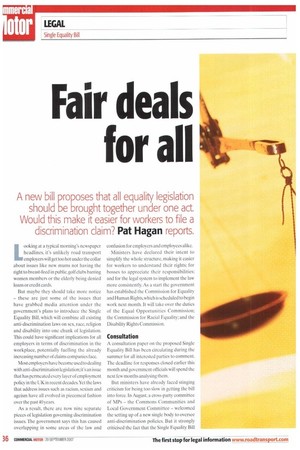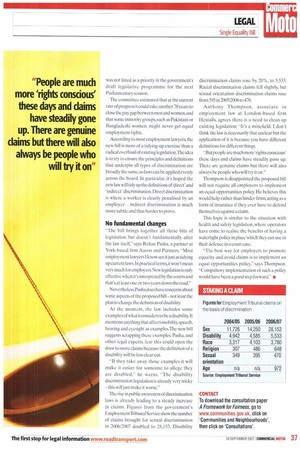Fair deals for all
Page 36

Page 37

If you've noticed an error in this article please click here to report it so we can fix it.
A new bill proposes that all equality legislation should be brought together under one act. Would this make it easier for workers to file a discrimination claim? Pat Hagan reports.
Looking at a typical morning's newspaper headlines, it's unlikely road transport employers will get too hot under the collar about issues like new mums not having the right to breast-feed in public, golf clubs barring women members or the elderly being denied loans or credit cards.
But maybe they should take more notice — these are just some of the issues that have grabbed media attention under the government's plans to introduce the Single Equality Bill, which will combine all existing anti-discrimination laws on sex, race, religion and disability into one chunk of legislation. This could have significant implications for all employers in terms of discrimination in the workplace, potentially fuelling the already increasing number of claims companies face.
Most employers have become used to dealing with anti-discrimination legislation; it's an issue that has permeated every layer of employment policy in the UK in recent decades. Yet the laws that address issues such as racism, sexism and ageism have all evolved in piecemeal fashion over the past 40 years.
As a result, there are now nine separate pieces of legislation governing discrimination issues. The government says this has caused overlapping in some areas of the law and confusion for employers and employees alike.
Ministers have declared their intent to simplify the whole structure, making it easier for workers to understand their rights; for bosses to appreciate their responsibilities: and for the legal system to implement the law more consistently. As a start the government has established the Commission for Equality and Human Rights, which is scheduled to begin work next month. It will take over the duties of the Equal Opportunities Commission; the Commission for Racial Equality; and the Disability Rights Commission.
Consultation
A consultation paper on the proposed Single Equality Bill has been circulating during the summer for all interested parties to comment. The deadline for responses closed earlier this month and government officials will spend the next few months analysing them.
But ministers have already faced stinging criticism for being too slow in getting the bill into force. In August, a cross-party committee of MPs — the Commons Communities and Local Government Committee — welcomed the setting up of a new single body to oversee anti-discrimination policies. But it strongly criticised the fact that the Single Equality Bill was not listed as a priority in the government's draft legislative programme for the next Parliamentary session.
The committee estimated that at the current rate of progress it could take another 78 years to close the pay gap between men and women, and that some minority groups,such as Pakistani or Bangladeshi women, might never get equal employment rights.
According to most employment lawyers, the new bill is more of a tidying-up exercise than a radical overhaul of existing legislation.The idea is to try to ensure the principles and definitions that underpin all types of discrimination are broadly the same,so laws can be applied evenly across the board. In particular, it's hoped the new law will tidy up the definitions of`direct' and 'indirect' discrimination. Direct discrimination is where a worker is clearly penalised by an employer indirect discrimination is much more subtle and thus harder to prove.
No fundamental changes "The bill brings together all these bits of legislation but doesn't fundamentally alter the law itself," says Rehan Pasha, a partner at York-based firm Aaron and Partners. "Most employment lawyers I know see it just as tidying up current laws. In practical terms, it won't mean very much for em pl oyers.New legislation is only effective when it's interpreted by the courts and that's at least one or two years down the road."
Nevertheless, Pasha does have concerns about some aspects of the proposed billnot least the plan to change the definition of disability.
At the moment, the law includes some examples of what it considers to be a disability It mentions anything that affects mobility, speech, hearing and eyesight as examples.The new bill suggests scrapping these examples. Pasha, and other legal experts, fear this could open the door to more claims because the definition of a disability will be less clear-cut.
If they take away those examples it will make it easier for someone to allege they are disabled." he warns. "The disability discrimination legislation is already very tricky this will just make it worse."
The rise in public awareness of discrimination laws is already leading to a steady increase in claims. Figures from the government's Employment Tribunal Service show the number of claims brought for sexual discrimination in 2006/2007 doubled to 28,153. Disability discrimination claims rose by 20%, to 5,533. Racial discrimination claims fell slightly, but sexual orientation discrimination claims rose from 395 in 2(X)5/2006 to 470.
Anthony Thompson, associate in employment law at London-based firm Hextalls, agrees there is a need to clean up existing legislation: "It's a minefield. I don't think the law is necessarily that unclear but the application of it is because you have different definitions for different things.
But people are much more 'rights conscious' these days and claims have steadily gone up. There are genuine claims but there will also always be people who will try it on."
Thompson is disappointed the proposed bill will not require all employers to implement an equal opportunities policy. He believes this would help rather than hinder firms, acting as a form of insurance if they ever have to defend themselves against a claim.
This logic is similar to the situation with health and safety legislation, where operators have come to realise the benefits of having a watertight policy in place which they can use in their defence in a court case.
"The best way for employers to promote equality and avoid claims is to implement an equal opportunities policy," says Thompson. "Compulsory implementation of such a policy would have been a good step forward." •






















































































































































































